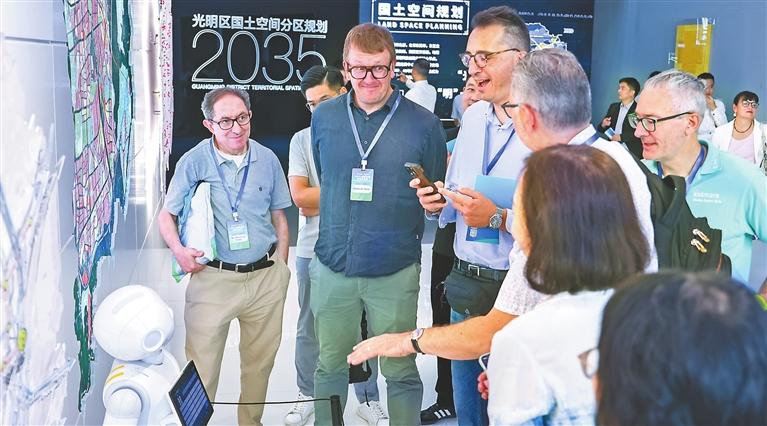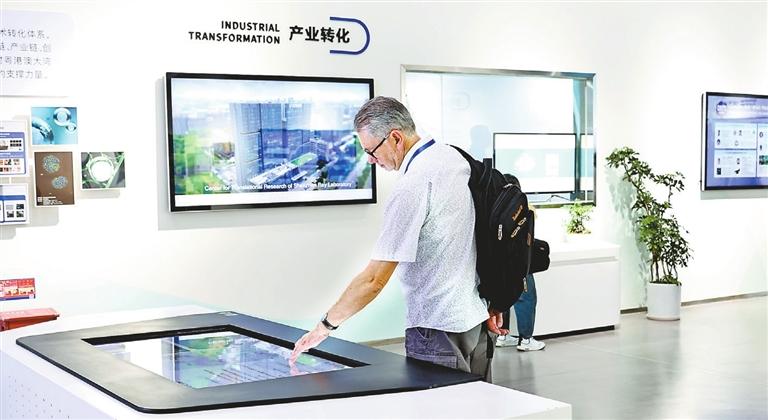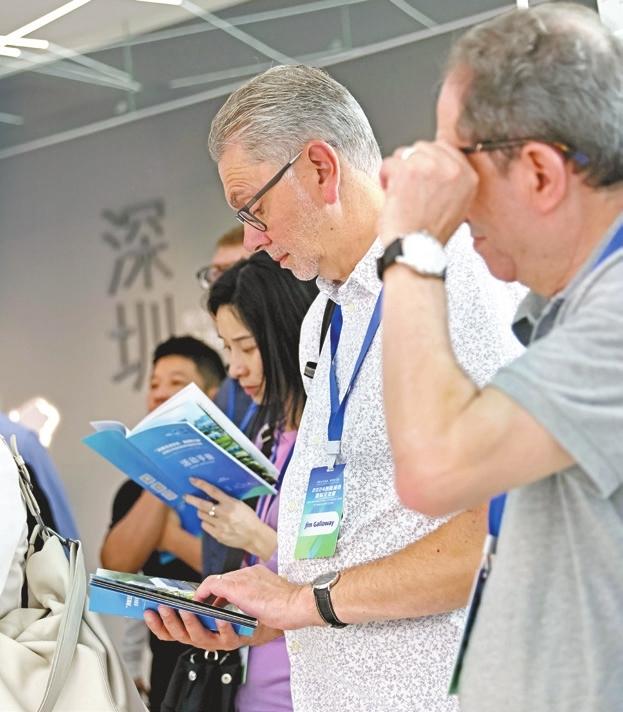






A DELEGATION of scholars and business executives from around the world recently explored Shenzhen’s Guangming District and came away impressed by the its robust innovation ecosystem. In a bid to strengthen innovation cooperation among cities, Shenzhen has established the World Innovative Cities Cooperation Organization with its city partners. As part of this initiative, the city hosts the annual Innovative Cities International Exchange Camp, which is designed to foster collaboration between cities and institutions. This year’s camp, themed “Innovation Ecosystem: The Power of Clusters,” drew experts, scholars, and business executives from a diverse range of cities to explore innovation platforms and parks. Participants shared insights on development strategies and discussed how cities can empower each other for mutual growth. During their visit to Guangming on Sept. 12, attendees toured several key attractions in the district that showcase its innovative ecosystem. Their first stop was the Guangming District Urban Planning Exhibition Hall, which offers a vivid portrayal of Guangming’s evolution and future prospects through an array of multimedia presentations, including laser shows and immersive experiences. “This is astonishing because this does not correspond to our typical image of Chinese mega cities,” remarked Christian Korner, head of entrepreneurship at the Technical University of Munich. “Usually in Germany or Europe, when you think of Chinese mega cities, you think of skyscrapers, concrete industrial zones, and traffic congestion. It’s very impressive to see what the north of Shenzhen is planning in terms of science and innovation. There’s a balance with nature. It’s not just buildings and streets — it’s about hiking and green parks. I think European cities could learn a lot from this approach,” Korner explained. Alessandro Ercolani, chief fun officer of Italian science and education enterprise erco_space, echoed Korner’s sentiments, saying, “The concept of integrating different types of research institutes with a strong focus on science is a huge investment. What I find particularly noteworthy is the emphasis on making this investment public — explaining how it operates and why it matters. It’s quite impressive.” The delegation then proceeded to the Industrial Innovation Center for Engineering Biology (Shenzhen). The center has a novel layout that combines laboratories and startups to foster collaboration between fundamental research and industrial applications, bridging the gap between technology and market demands. “The whole week has been absolutely fascinating,” said Jim Galloway, a founding director at Edinburgh Global Ltd. “Shenzhen is clearly on its way to becoming an innovation science center. The infrastructure in place is mind-blowing — something we could only dream of in the U.K. There are many collaboration opportunities between Edinburgh and Shenzhen, particularly with our new innovation data-driven institutes,” Galloway said. The group also visited the Shenzhen Bay Laboratory, which focuses on cancer prevention, diagnosis, and treatment, as well as the BTR New Energy Technology Building and Science Park. Rita Roider, from the Department of Labor and Economic Development in Munich, commended the amount of support for startups at the Shenzhen Bay Laboratory, saying, “I’m very impressed that you nurture startups in their earliest stages. This support allows them to focus on their core business.” Luca Foresti, an entrepreneur and health-care investor, expressed admiration for the lab’s approach, saying, “In Europe, we don’t have such a supportive environment for scientific development. The vision for these labs and the number of professors involved is impressive.” The attention also turned to the BTR New Materials Group, a prominent energy materials manufacturer. “We have to produce these new materials in a sustainable way,” Korner noted. “And this is, I think, what BTR probably does when they have their research and development department to find ways on how to gather the materials more sustainably.” Reflecting on their experience in Guangming District, Korner added, “It is astonishing what the district is trying to achieve at such speed. We only got a brief glimpse of the potential here. I would love to return to see the startups at the innovation center and learn more about their operations and support systems.” Looking ahead, Korner said, “We’ve already discussed collaborating with partners in the startup and entrepreneurship sectors. We aim to bring German or European startups here to experience the ecosystem while also helping Chinese startups understand the European market, fostering mutual benefits.” | 
